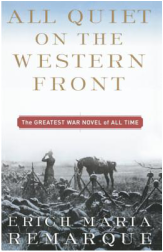
I first read Erich Maria Remarque's classic story of Word War I five or six years ago, with a sophomore world literature class. I didn't appreciate it nearly as much then as I did on this rereading. It's a masterful, philosophical, heart-rending account of the final year of the war, told through the eyes of 20-year-old Paul Bäumer, one of seven high-school classmates who was guilted by his schoolmaster into volunteering for the army.
Obviously, the possibility of death consumed the young men as they alternated time at the rest stations and in the trenches on the Western Front--the battle lines between the Germans and the Allied forces of France, England, and America. But Paul is almost more afraid of what life will be like when the war is over. He gets a taste of it on his first major leave, when everything at home feels different and ruined. But late in the novel, we get Paul's best explanations of what it feels like to be part of what Gertrude Stein would call "the lost generation," a generation of men who grew up with war as their "first calling in life." Yet he feels an affinity with soldiers on the other side of the front when he realizes they face the same emptiness.
Obviously, the possibility of death consumed the young men as they alternated time at the rest stations and in the trenches on the Western Front--the battle lines between the Germans and the Allied forces of France, England, and America. But Paul is almost more afraid of what life will be like when the war is over. He gets a taste of it on his first major leave, when everything at home feels different and ruined. But late in the novel, we get Paul's best explanations of what it feels like to be part of what Gertrude Stein would call "the lost generation," a generation of men who grew up with war as their "first calling in life." Yet he feels an affinity with soldiers on the other side of the front when he realizes they face the same emptiness.
I am young, I am twenty years old; yet I know nothing of life but despair, death, fear, and fatuous superficiality cast over an abyss of sorrow. I see how peoples are set against one another, and in silence, unknowingly, foolishly, obediently, innocently slay one another. I see that the keenest brains of the world invent weapons and words to make it yet more refined and enduring. And all men my age, here and over there, throughout the whole world see these things; all my generation is experiencing these things with me. What would our fathers do if we suddenly stood up and came before them and proffered our account? What do they expect of us if a time ever comes when the war is over? Through the years our business has been killing;--it was our first calling in life. Our knowledge of life is limited to death. What will happen afterwards? And what shall come out of us?
Much of that is the damage that war does to all soldiers, but for Paul and his contemporaries, it's more than that. His generation is unique in that war is all they have known, and they don't have the same social anchors that older soldiers have. With the war winding down, Paul tries to understand what the future will bring for his generation.
And men will not understand us--for the generation that grew up before us, though it has passed these years with us already had a home and a calling; now it will return to its old occupations, and the war will be forgotten--and the generation that has grown up after us will be strange to us and push us aside. We will be superfluous even to ourselves, we will grow older, a few will adapt themselves, some others will merely submit, and most will be bewildered;--the years will pass by and in the end we shall fall into ruin.
Remarque's novel was published in 1929, so he didn't know that World War II wasn't far off, but as a staunch critic of society, his books were the target of frequent Nazi book burnings. To me the importance of this novel isn't the naked depiction of the brutality of war, although that's certainly a feature of the novel, but the realization that Paul achieves that all soldiers and families suffer the same heartbreak from the war, regardless of nation. It is a universal suffering Paul experiences and describes for us, and the somber, dark, understated ending is unforgettable.
 RSS Feed
RSS Feed
